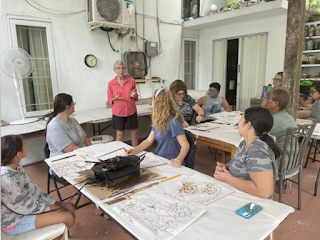JAPANESE GROUP PROMOTES CHAMORRO CULTURE
I recently spent a very interesting four days as guest of a
Japanese Chamorro dance group, Guma’ Famagu’on Tano’ Yan I Tasi, based in Tama,
Japan, on the outskirts of Tokyo.
The group was founded by Professor Kyoko Nakayama, of the Teikyo
University Department of International Relations. She was inspired to form her dance group through a program
initiated by Master of Chamorro Dance, Frank Rabon. Funded by the Guam Visitors Bureau’s Chamorro Dance Academy,
the program encourages the formation of Chamorro dance groups within Japan, to
build awareness of Chamorro culture.
Guma’ Famagu’on Tano’ Yan I Tasi recently celebrated their fifth anniversary,
and has an active dance group of more than 30 members supported by many former
members. Activities shared on
their Facebook page are evidence of their dedicated work and passion for
Chamorro culture. They have
visited Guam annually to participate in our Gef Pa’go Dinana’ Minagof Chamorro
Dance Festival, with side trips to Saipan, Tinian and Rota. Additionally, they have hosted Chamorro
visitors to Japan, including Chamorro dance groups.
One of their upcoming events is an exhibit of Chamorro
culture through artifacts, crafts, and paintings shared by Dr. Kyoko’s many
friends in the Mariana Islands.
The exhibit will take place January I6 – 22 at the Teikyo University
Museum. I was asked to speak to
classes at the university and to help the group members create a large batik
mural painting to be featured in the exhibit. My days were a whirlwind of cultural exchange with a unique
twist. Many members are passionate
to learn the Chamorro language.
Much of my informal time with the group was spent teaching Chamorro
words and sentence structure to very serious, dedicated students. While the students struggled to
communicate in English, and my Japanese language skills were even more limited,
we found common ground through the use of Chamorro words that they knew through
the Chamorro songs they sang in their dances! Our gatherings reminded me of the many times I spent with
our own Chamorro dance groups on tour and at home, with guitar music and familiar
songs in the background, cooking and eating Chamorro food. Professor Kyoko’s university office was
headquarters for her student dancers to assist her with group activity
planning, and to store the usual paraphernalia associated with dance groups –
costumes, tunas (dance sticks), posters, coconut shells, woven baskets, etc.,
including the usual rice pot needed for group gatherings. Activities extended to her home, where
members gathered to assist in hosting activities and materials
preparation. While they made sure
I did experience some wonderful Japanese food and culture, in many ways I felt
like I never left home!



Comments
Post a Comment